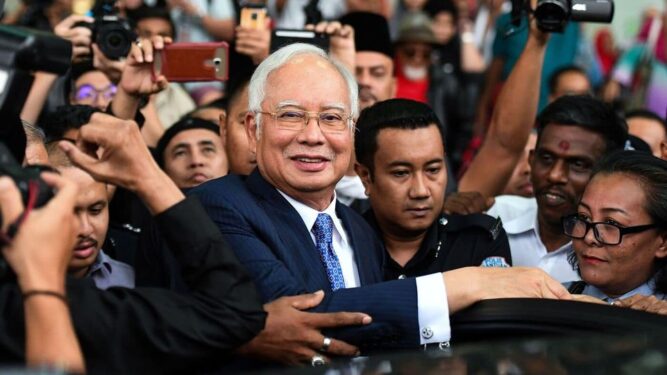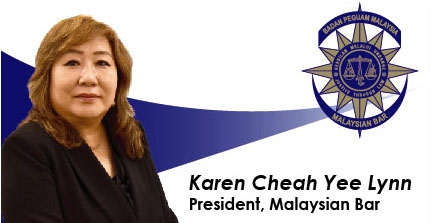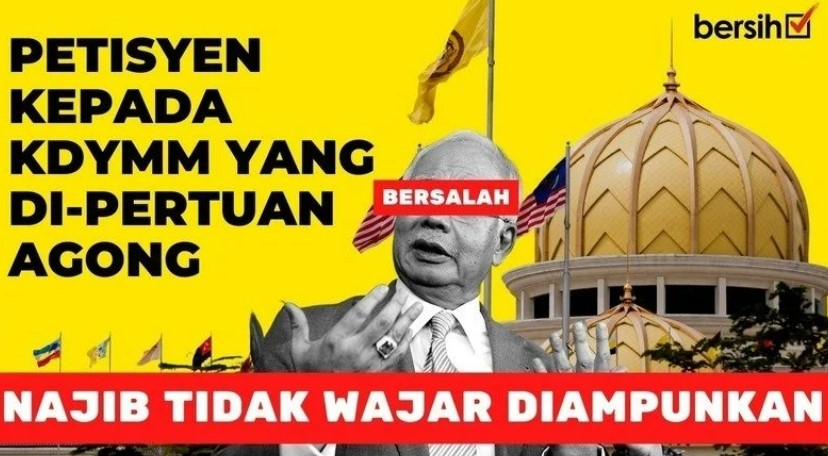THE Malaysian Bar has beaten DAP and PKR – two key component Pakatan Harapan (PH) parties – in expressing its deep disappointment over the reduction of incarcerated former premier Datuk Seri Najib Razak’s prison sentence and fine following his conviction in misappropriation of funds belonging to SRC International Sdn Bhd.
The Pardons Board’s recent announcement puts enormous doubt in the eyes of Malaysians and the world as well as the Madani government’s commitment to upholding the rule of law and to eradicating corruption, according to its president Karen Cheah Yee Lynn.
“The Malaysian Bar asserts that the Executive has lost its moral authority to address the public and to purportedly defend their fight against corruption when it is abundantly clear that despite the entire nation being embarrassed and suffering from the crimes committed by Najib, singular and preferential treatment was given to him through the Pardons Board,” she asserted in a media statement.
“The reduction of Najib’s sentence and fine was abhorrently disproportionate to the gravity of the crime committed by him.”
Although it is undeniable that the Yang di-Pertuan Agong (YDPA) would be fully aware of the doctrine of separation of powers which determines three branches, namely the Executive, Legislature, and Judiciary, the Malaysian Bar noted that “one branch may overshadow another or two branches may necessarily overlap”.
“Such is the situation that has come to pass where the decision of the courts to punish Najib with a prison term of 12 years and a fine of RM210 mil was disproportionately reduced to a prison term of six years and a fine of RM50 mil,” lamented the professional body which regulates the profession of lawyers in Peninsular Malaysia.

“The issuance of the announcement under the Prime Minister’s Department is rather telling of the role the Executive played in the Pardons Board for the YDPA to accept the advice and act accordingly under the Federal Constitution.
Reform the Pardons Board
The Malaysian Bar also finds it equally disturbing that the Madani government has chosen to curb the freedom of speech as guaranteed in the Federal Constitution by choosing to silence dissent using the convenient excuse of fanning 3R (religion, race and royalty) sentiments.
“The overwhelming outcry by Malaysians is an exercise of the right to express their utmost dissatisfaction that the justice they sought by participating in the 2018 and 2022 general elections has all come to naught as a result of the decision to reduce Najib’s sentence,” contended the Malaysian Bar.

As such, the recent announcement by the Pardons Board highlights the need for institutional reform to provide safeguards and re-establish its credibility, specifically with respect to the composition of the Pardons Board, according to the Malaysian Bar.
“In order to prevent the influence of the Executive and to ensure independence in the pardons process, it is necessary to reduce – if not completely eliminate – the role of the government in the Pardons Board,” the Malaysian Bar pointed out.
“To this end, an amendment is required to remove the influence of the Attorney-General (AG) and the Minister of Federal Territories or Chief Ministers of states in the Pardons Board, and to appoint independent persons to the board to ensure inclusivity in terms of expressions from the public.”
A further reform to the Pardons Board would be to introduce safeguards that ensure such power is exercised sparingly as well as within clear boundaries and established circumstances or categories.
“Remorse and repentance surely must be a substantial part of such an exercise,” stressed the Malaysian Bar. “To-date, after having served one year and five months in prison, Najib has yet to show remorse, any form of repentance, nor apology for committing the offences of criminal breach of trust, abuse of power and money laundering, for which he was convicted.”
The Malaysian Bar further “unequivocally insists that the deterioration of due process cannot go unchecked and unimpeded”.
“It is alarming that this announcement by the Pardons Board comes in relatively close succession with another controversial high-profile case, namely Datuk Seri Ahmad Zahid Hamidi’s discharge not amounting to an acquittal (DNAA) in the Yayasan Akalbudi case,” it observed.
“The Malaysian Bar cannot stress enough that a similar discharge must not recur for Najib’s ongoing 1MDB (1Malaysia Development Bhd) prosecution and two other on-going cases, failing which will render the government’s efforts to combat corruption hollow and meaningless, hence sending the message that political power holds the rule of law in shackles.” – Feb 7, 2024
Main pic credit: Change.org









